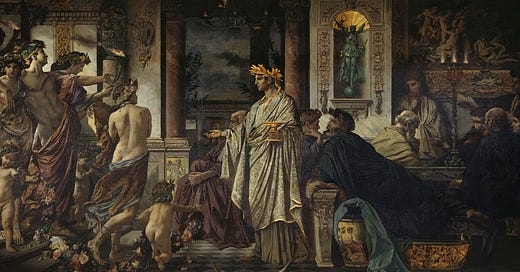At this time all deities removed themselves from earth
And Jove himself abandoned his golden throne.—Suetonius
Feast of the Twelve Gods
It was a secret affair, six courses on silverware.
Fine Delos plates, and goblets engraved with centaurs.
A Greek slave offered bread from a miniature oven
to the Pantheon reclining on a triangle of couches.
There was wild goose and lobster, woodcock
and chicken, pike and mullet, and African figs,
truffles, tart, and pigeon, fried kidneys soaked
in garum, sow’s womb, and a Trojan pig.
Each god had a jar of custom Corinthian bronze
full of Massic vintage flavored with rose petals.
A poet in drag declaimed to them their virtues.
Caesar was the god of light, Phoebus Apollo.
They joked that wine was nectar, honey ambrosia.
The costumes were resplendent, the music gay.
But rumor spread, and people rioted, because
a drought had robbed them of their dole of grain.The Feast of the Twelve Gods was a private dinner party held by Caesar (Octavian) around 39 BC, not long after the Battle of Philippi. The second triumvirate was now firmly in power, having defeated the liberators and murdered much of the opposition by proscription.
The symbolism of the event is telling, as Julius Caesar had recently been deified (a temple would soon be build to commemorate this) and Octavian was keen to associate himself with his divine father. During the dinner he played the role of Apollo. According to Suetonius, the banquet was kept a secret because there was a general scarcity in Rome at the time.
The scandal of this banquet was the greater because of dearth and famine in the land at the time, and on the following day there was an outcry that the gods had eaten all the grain and that Caesar was in truth Apollo, but Apollo the Tormentor, a surname under which the god was worshipped in one part of the city. He was criticized too as over fond of costly furniture and Corinthian bronzes and as given to gaming. Indeed, as early as the time of the proscriptions there was written on his statue—
“In silver once my father dealt, now in Corinthians I,”
since it was believed that he caused some men to be entered in the list of the proscribed because of their Corinthian vases.
Much of the poem is based on Suetonius’s account, as well as details from Trimalchio’s dinner party in Petronius’s Satyricon.
The end of the Republic was multifarious in its causes, but certainly one of the contributing factors was the blurring of the lines between the state, its ruler, and the gods. It would not be remedied in the West until Christ uttered the provocative line, “Render unto Caesar the things that are Caesar's, and unto God the things that are God's.”
Thank you for reading
Some other poems in the series so far:
“The Ritual Sacrifice of Caesar” - On Caesar’s assassination
“Caesar Ultor” - Caesar takes bloody revenge for his murder
“Caesar Triumphator” - As a god, ruminating on the order he’s created
“Capo the Aquari” - On getting by in the Empire
“The Sibyl Hands Superbus the Books” - The voice of the Sibyl casts a warning
“SPQR” - on the bodies of the State
“Civitas” - On the sentiments of the optimates and the populares
“Vixerunt” - On the fate of the Catiline conspirators
“The Coming of Caesar” - Heroic, galloping dactyls on the omens foreboding Caesar
“Populus” - On Caesar’s political victory over Cato
“Res Publica” - On the decay of the State
“Veni Vidi Vici” - On Caesar’s 10+ years of military ascension





Great job
Great poem - it’s not easy to capture the ancients - but you succeed!